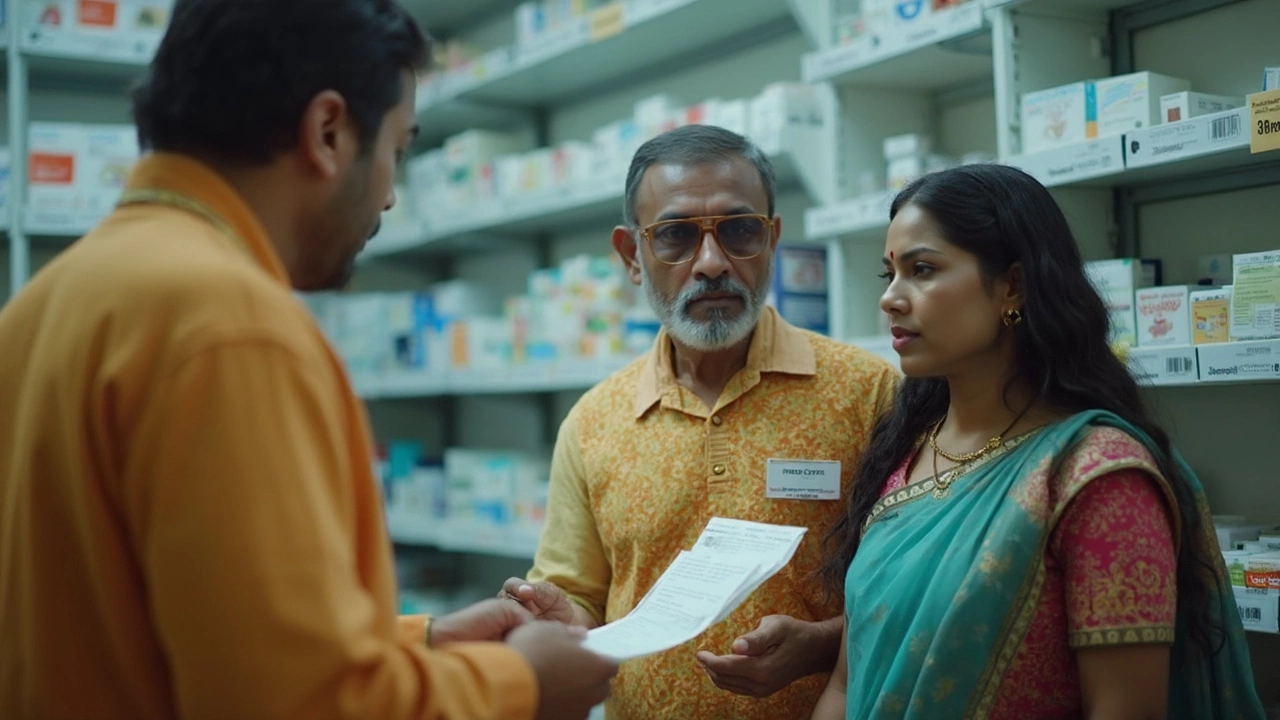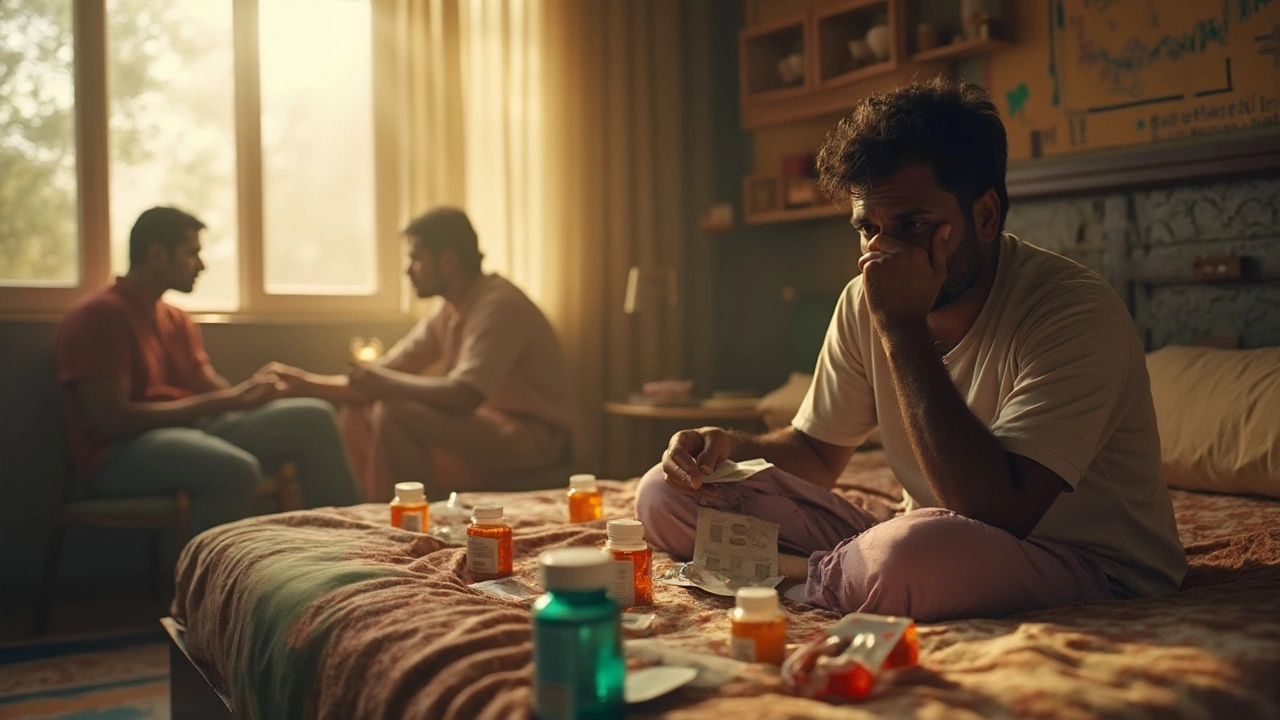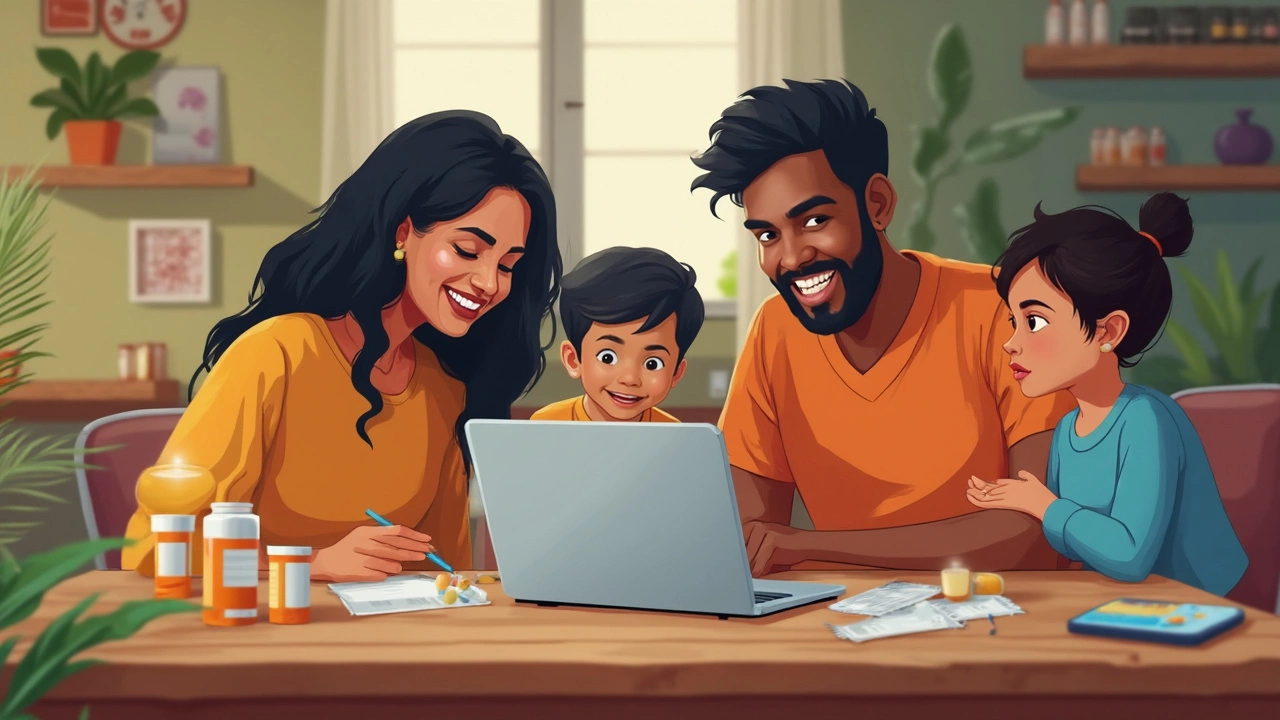
Confused about whether trazodone is a narcotic? You're not the only one. This question pops up a lot, especially for anyone who’s browsing online pharmacies or thinking about sleep meds. Trazodone shows up in a lot of search results, but some info is misleading—or just plain wrong.
Here’s the truth: trazodone is not a narcotic. It works nothing like opiates or controlled painkillers. In pharmacies, narcotics get super tight controls because of their abuse potential. Trazodone isn’t anywhere near that category—it’s an antidepressant first, and a sleep aid second. Still, people have questions because doctors sometimes prescribe it for insomnia or anxiety, not just depression. That’s where the confusion starts.
Before clicking that “add to cart” button, it helps to know exactly what trazodone does, why it’s prescribed, and what you should watch for. Pharmacies don’t put it on the same shelf as narcotics—and for good reason. But just because it’s easier to get doesn’t mean there are zero risks or side effects. Understanding how trazodone works can save you headaches (sometimes literally) down the line.
- What Exactly Is Trazodone?
- Trazodone vs. Narcotics: The Real Difference
- How People Use Trazodone—And Why
- Safety, Side Effects, And Risks
- Buying Trazodone Online: What To Know
- Tips For Safe And Smart Use
What Exactly Is Trazodone?
Trazodone is a medicine that doctors usually prescribe for depression. It’s been around since the 1980s, and over the years, it’s become popular for helping people with trouble sleeping, too. The thing is, trazodone doesn’t work like classical sleeping pills or typical anxiety meds—you won’t find it listed with the usual controlled substances.
As for its category, trazodone is technically called a serotonin antagonist and reuptake inhibitor (SARI). That means it balances brain chemicals linked to mood and sleep, especially serotonin. Unlike narcotics or opioids (like oxycodone or codeine), trazodone isn’t used for pain and doesn’t have that same addictive punch.
Check out these quick facts about trazodone:
- Prescription only—no over-the-counter versions exist.
- Mainly used for depression, but many doctors give it "off-label" for insomnia.
- Does not cause a "high" or typical signs of narcotic use.
- Comes in tablet or extended-release forms.
- Usually starts working for sleep within one to two hours, but mood effects take a few weeks.
The FDA gave trazodone the green light for depression treatment, but it landed in the sleep aid world because it’s less likely to form habits compared to classic sleeping meds.
Here’s how trazodone compares to common meds in pharmacies:
| Drug Name | Category | Main Use | Controlled Substance? |
|---|---|---|---|
| Trazodone | Antidepressant (SARI) | Depression, Insomnia (off-label) | No |
| Oxycodone | Narcotic/Opioid | Pain relief | Yes |
| Zolpidem (Ambien) | Sleep Aid (non-benzodiazepine) | Insomnia | Yes |
| Sertraline (Zoloft) | Antidepressant (SSRI) | Depression, Anxiety | No |
Bottom line: If you ever spot trazodone in an online pharmacy’s narcotics section, that’s a big red flag. It simply isn’t one. But just like any prescription, you want to use it exactly as your doctor says—no more, no less.
Trazodone vs. Narcotics: The Real Difference
So, what really separates trazodone from narcotics? The answer is all about how these drugs work in your body and why pharmacies treat them so differently.
Narcotics (think oxycodone, morphine, or codeine) are mostly painkillers. They change how your brain perceives pain and can trigger a strong feel-good hit—one reason they’re so addicting. Because of that, they’re super tightly controlled in most countries. You’ll need a special prescription, and there are limits on how much you can get at one time.
Trazodone, on the other hand, isn’t even in the same ballpark chemically or legally. It’s technically an antidepressant called a serotonin antagonist and reuptake inhibitor (SARI for short). Instead of messing with your pain signals, it changes the level of serotonin in your brain. That’s why it’s used for depression and sometimes to help with sleep—not pain control. It doesn’t give you a rush or high, so most people aren’t tempted to abuse it.
- Main use for narcotics: Strong pain relief for things like surgery, injuries, or chronic pain.
- Main use for trazodone: Helping with depression, anxiety, and sometimes insomnia.
- Addiction risk: Very high for narcotics; extremely low for trazodone.
- Legal category: Narcotics are controlled substances; trazodone isn’t controlled in the same way and is more straightforward to prescribe and buy.
Take a look at this quick comparison for clarity:
| Feature | Narcotics | Trazodone |
|---|---|---|
| Main use | Pain relief | Depression, sleep |
| Addiction potential | High | Low |
| Controlled legal status | Strict | Standard prescription |
| Common withdrawal | Yes, often severe | Rare, milder |
The bottom line is, you won’t have to jump through as many hoops to get trazodone, and you’re not dealing with the same risks or legal headaches as with narcotics. Still, it’s smart to use trazodone exactly as your doctor recommends—just because it isn’t a narcotic doesn’t mean you can ignore the instructions.
How People Use Trazodone—And Why
Trazodone first got approval in the U.S. as an antidepressant all the way back in the 1980s. But if you check prescription stats today, a lot of folks actually take it to help them sleep, not just for depression. Doctors noticed early on that trazodone’s biggest side effect—making people drowsy—could actually be pretty useful. That’s why you see trazodone written up as a sleep aid way more than other antidepressants. In fact, about 70% of trazodone prescriptions in the States are now for sleep problems instead of depression.
Here’s the deal: trazodone isn’t a sleeping pill like Ambien or controlled sleep meds. It’s used in lower doses (say, 25-100 mg for sleep, versus 150 mg and higher for depression) to help people nod off easier and stay asleep. People who can’t tolerate stronger sedatives, or who want to avoid addictive drugs, often end up trying trazodone. It’s not habit-forming and doesn’t cause the same withdrawal misery as benzos or narcotics.
"Trazodone is commonly prescribed off-label for insomnia because of its favorable safety profile and lack of abuse potential compared to traditional hypnotics." – Dr. Michael Breus, PhD, Sleep Specialist
Some other reasons people end up with a trazodone prescription:
- Managing anxiety along with depression, since it calms nerves and helps with sleep.
- Helping older adults or people with chronic illnesses sleep, where most sleep meds aren’t safe.
- Reducing symptoms related to PTSD or panic disorders (again, mostly for the sleep troubles).
And just so it’s clear, here’s a quick breakdown of how trazodone is prescribed for different uses:
| Purpose | Common Dose (mg) | Notes |
|---|---|---|
| Depression (primary use) | 150–300 mg/day | Split into 2-3 doses |
| Insomnia (off-label) | 25–100 mg at bedtime | Single night dose |
| Anxiety/Augmentation | 50–150 mg at bedtime | As add-on med |
So, people reach for trazodone mostly because it gets the job done for sleep without turning you into a zombie the next day. And while it’s not a miracle fix, thousands vouch for it being a solid option if you're dealing with insomnia and want to skip the hard stuff.
Remember the keyword: trazodone—not a narcotic, but certainly a practical tool when used the right way.

Safety, Side Effects, And Risks
So you’re thinking about trazodone for sleep or depression. You’ll definitely want to know what to expect. While this med isn’t a narcotic, it still packs some real effects—good and not-so-good. Let’s break it down.
The most common side effect? Drowsiness. For some, that’s the whole point. But trazodone can also make you feel dizzy or lightheaded, especially if you stand up too quickly. Dry mouth and headaches also show up a lot. Some people notice blurred vision or feel shaky. And yes, stomach problems like nausea can happen, too.
Here’s a quick side effects snapshot, ranked by how often they happen:
| Side Effect | How Common? |
|---|---|
| Drowsiness | Up to 40% |
| Dizziness | About 20% |
| Dry Mouth | 15%-20% |
| Headache | 15% |
| Nausea | 10%-15% |
Now for the less common, but more serious stuff. Trazodone can rarely cause changes in your heart rhythm, so it’s not a great fit for folks with certain heart issues. Ever heard of priapism? It’s a painful, long-lasting erection. Super rare, but it can happen—and it’s an emergency if it does. Some users—especially young adults—might notice odd mood changes or even thoughts of self-harm. If that happens, it’s doctor time, no debate.
Mixing trazodone with alcohol, painkillers, or other sedatives can lead to dangerous levels of sleepiness or trouble breathing. Do not double up with other sleep meds unless your doctor’s on board. Oh, and quitting trazodone suddenly can bring on withdrawal symptoms, so most people need to taper off slowly if they stop.
- Take the first dose at night, since drowsiness hits hard
- Don’t drive or handle power tools until you know how it affects you
- Tell your doc about all other medicines you’re taking (especially if you’re on other antidepressants, blood thinners, or heart meds)
- If you get any weird side effects—like chest pain, fainting, or erection that won’t go away—get medical help fast
Bottom line: trazodone is safer than most sleeping pills, but it’s not risk-free. Paying attention to your body and being open with your doctor is the best way to avoid surprises.
Buying Trazodone Online: What To Know
Getting trazodone from an online pharmacy may sound simple, but there are a few things you need to keep in mind. First, you can’t legally buy trazodone in the U.S. without a prescription, even though it isn’t a controlled substance. Online pharmacies that sell it without a prescription are shady and may not send real meds. Always check that the site asks for a valid prescription.
Look for online pharmacies certified by groups like the National Association of Boards of Pharmacy (NABP) or sites ending in “.pharmacy.” These are safer bets for getting legit trazodone and not a random powder in a capsule. Never trust online stores selling at a price that seems way lower than your local pharmacy—they could be peddling fakes or expired stuff.
Some data shows how much prices can change online compared to brick-and-mortar spots. Check this out:
| Location | Average 30-day Supply Cost (50mg) |
|---|---|
| Local U.S. Pharmacy | $16 - $30 |
| Online Pharmacy (Reputable) | $12 - $28 |
| Online Pharmacy (Dubious) | As low as $5 (often unregulated) |
Always avoid the too-good-to-be-true deals. If it costs less than a coffee, it’s a big red flag.
Here’s a quick checklist for buying trazodone online:
- Make sure you have a doctor’s prescription.
- Stick with NABP or “.pharmacy” certified sites.
- Look for an actual physical address and phone number on the website.
- Check if a licensed pharmacist is available to answer questions.
- Get a receipt with your name, the med details, and pharmacy info.
Remember, legit online pharmacies care about your safety, not just selling meds. Never be shy to double-check with your doctor before placing an order. If something feels off, trust your gut and walk away.
Tips For Safe And Smart Use
Taking trazodone? Here’s how to do it right and keep headaches to a minimum (the literal and the metaphorical ones!). First off, don’t just double up on doses if you feel like it’s not working fast enough. This isn’t one of those meds where more is better. Always stick to what your doctor tells you—even if you get it online, the rules are the same.
Keep these points in mind if you want to use trazodone safely:
- Take it at the same time every day, usually at night, since it can make you drowsy.
- Don’t drink alcohol while on it—it cranks up the side effects.
- If you miss a dose, skip it. Don’t take two together to "catch up"—that’s asking for trouble.
- Watch out for drowsiness or dizziness, especially when you first start.
- Tell your doctor if you use other stuff like sleeping pills, antidepressants, or herbal sleep aids. Mixing can go bad quickly.
- Let your doc know right away if you get anything weird—like chest pain, a racing heart, or sudden mood swings.
Some stats help paint the real picture. Here’s a quick snapshot of known trazodone side effects, based on what’s been reported over the last few years:
| Common Side Effect | Rough % of Users Affected |
|---|---|
| Drowsiness | Up to 40% |
| Dizziness | 20-25% |
| Dry Mouth | 15-18% |
| Headache | 12-15% |
| Nausea | 10-12% |
If you’re buying trazodone from an online pharmacy, double-check it’s a legit one. Look for clear contact info, proper licensing, and real pharmacists available for questions. Skip sketchy sites that skip the prescription step—that’s a flashing red light.
Lastly, never share your meds with anyone else, even if their symptoms sound just like yours. Everyone reacts differently. What’s safe for you could mess someone else up. When in doubt, ask your doctor or pharmacist. A quick call is way easier than fixing a mess later.







